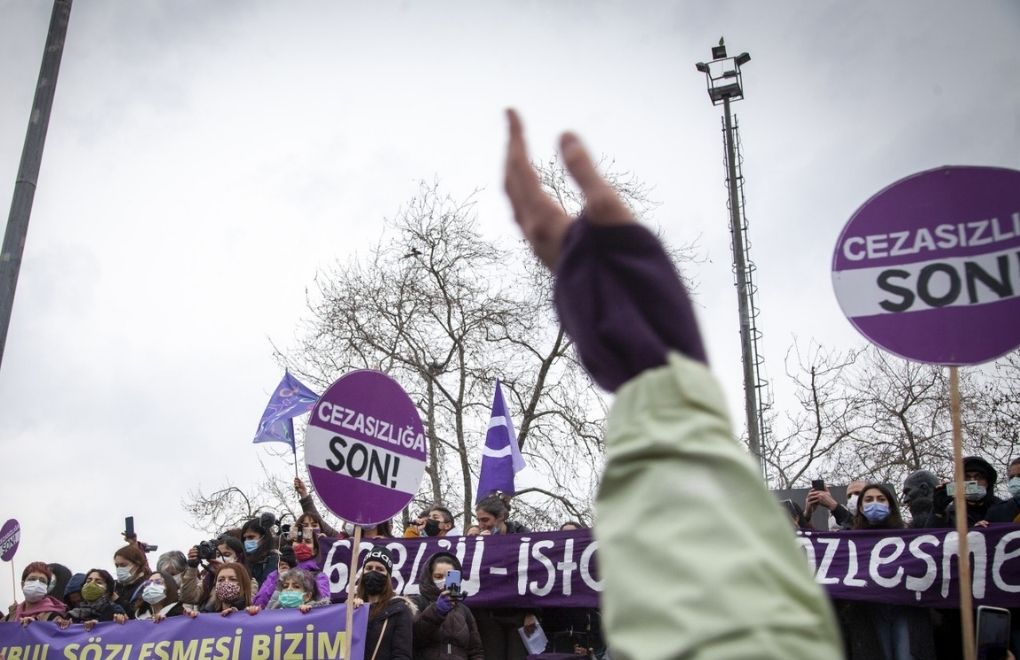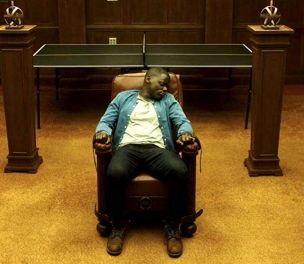* Photo: Meltem Ulusoy / csgorselarsiv.org
Click to read the article in Turkish / Kurdish
|
As part of the project "In Good Times and Bad: Living Together" where we consider the issue of living together by relating it to various themes, the article "Punishment" reviews the impunity regime by consulting the opinions of lawyers, through observations from the courtrooms.
You can listen to the first episode (Family) of the "In Good Times and Bad: Living Together" podcast (in Turkish) here: Spotify, ApplePodcast, Youtube
We asked the following question to six lawyers involved in different cases: "What is the attitude of the judicial institution towards the perpetrator as a whole in the cases that you pursue? What can you say about the notion of impunity in Turkey?"
Lawyers Kerem Dikmen, Berrin Demir, Emel Ataktürk, Fatoş Hacıvelioğlu, Tugay Bek, and Veysel Vesek reviewed how impunity policy functions in the cases they pursue, the common threads that are salient in some cases, the wounds caused by the shield of impunity, and the ongoing struggle in this respect.
'State is more tolerant in crimes committed against the queer'
Lawyer Kerem Dikmen: Impunity in LGBTI+ cases
What comes to mind when one says judicial institution? Police station, prosecution office, coroner judge, court... All are parts of a whole. Citizens apply to these expecting justice. Because they are told that people made an unwritten contract, and via this contract, they delegated their authority for judging and using power to the mechanism called the state. That is, the authority indeed belongs to them, the state uses it on their behalf. However, the nature of how it works changes when the applicant, the one who expresses demand for justice is an LGBTI+. The queer* is in the plaintiff's chair, but finds themselves answering the questions that should be addressed to the suspect. Why were they at that location at that time, why did they share it on social media, was it not obvious that the perpetrator was going to behave the way they did, so why not get on the right side of the perpetrator?
The queer is stabbed, beaten, murdered. They somehow reach the courtroom. The family does not usually support them. The civil society's request to attend the trial is always denied, they are alone. They now have to explain what they have been telling people individually before, to the judges in front of others. The psychology of the hypothetical burden on their back is so heavy that they are about to move to the defendant's chair from the plaintiff's chair. On this occasion, the defendant benefits more from doubt. Even the prosecutor benefits from it. But wait, wasn't the prosecutor on their side? Everybody has concentrated on mitigating causes. Was the queer raped or tortured before being murdered, have they been a hate victim? The verdict is given, but it distinctly differs from the punishment for a crime against the "normal." The idea that the state is more tolerant in cases of crimes committed against the queer has gained strength in the society. The defendant may have been punished, but the release is soon. Conditional release, open prison, probation, partial pardon. One will surely find a way.
* "LGBTI+" in LGBTI+ language
'Trials are too inefficient to prevent crime'
Lawyer Berrin Demir: How impunity works in occupational homicides
In Turkey, a civil lawsuit is filed against the persons responsible for the death of the worker who lost their life due to occupational homicides. Even though most of the occupational homicides in our country fall into the framework of "eventual intent" defined in the Turkish Penal Code (TCK) 21/2, the responsible parties are penalized based on inadvertent negligence. For example, Boğaziçi Electricity Distribution (BEDAŞ) worker Erkan Keleş was sent to work to repair an electricity failure in Istanbul's Arnavutköy on September 10, 2010; he lost his life, electrocuted in high-voltage lines. In order to be able to work in high-voltage lines, which falls in the "very dangerous" work safety class, equipment such as insulated gloves, insulated boots, hot sticks are indispensable work safety equipment. Having sent Erkan Keleş to high-voltage lines for a repair without this equipment is clearly an eventual intent. All those responsible for it must be penalized based on eventual intent.
And yet even the criminal suit for Erkan Keleş could be filed three years after his death. The case that took place at Istanbul 2nd High Criminal Court concluded on March 13, 2018 after depleting all stages. The court sentenced each defendant to imprisonment of 4 years and 2 months based on TCK 85/1, which allowed the minimum punishment. These sentences were then converted to judicial fines ranging between 30 thousand and 60 thousand Turkish Lira (TRY), which were then split into 24 installments in order not to cause any inconvenience to the defendants. As is well known, these criminal fines go to the state treasury. The family's suit for pecuniary and non-pecuniary damages is currently at the Court of Cassation.
That trials are too inefficient to prevent crimes, that they continue over years, that the employers involved in decision mechanisms are not effectively tried, that usually low-rank persons that do not have the authority to budget for ensuring the operations and the work safety and to enforce the measures, like first-step administrators referred to as employer's representatives, occupational health and safety experts, managers, workers, headpeople are penalized, that the penalties are converted to criminal fines, which are then split into installments, point altogether to an impunity system and not a penal system. Under these conditions, the employer does not want to bear the cost to ensure the work safety rules. They abstain from practicing the measures that they view as factors slowing down the work. The employer who also takes into account the absence of effective mechanisms inspecting whether the work safety rules are practiced or not and the observation that civil lawsuits for occupational accidents end up with criminal fines in the worst case, does not spend any effort to ensure the work safety measures. It is clear that this mechanism and impunity system cannot reduce occupational homicides, but will lead to further occupational homicides.
'Impunity causes further crimes'
Lawyer Emel Ataktürk: Common threads of impunity cases
Impunity is a notion used to describe every legal and factual obstacle before the investigation of a crime's perpetrators, their trial, their punishment, and the execution of the punishments.
When we speak of impunity, we always talk about an area related to the state's responsibilities; that is, about the responsibility of the state that does not investigate the perpetrators involved in whatever the context of the crime or the breach is, that does not punish or does not execute the punishments through practices like amnesty and consequently protects the perpetrators directly or implicitly. As opposed to the general belief, the issue we refer to as impunity indeed appears in a much larger context including violation of rights directed against ethnic or religious minorities, women, children, LGBTI+ individuals, hate crimes or crimes against the nature / the environment, rather than only the violation of human rights directed against the political opponents.
Of course, impunity practices in different contexts may exhibit different patterns, but without any doubt there are some common threads in all contexts and it is easily possible to say this: While Turkish, white, Muslim, Sunni, and men are the least affected by the impunity policy, the most affected are everyone outside this line, namely Kurdish, Armenian, Rum, Jewish, Alevi, women, children, LGBTI+ individuals... I always witnessed the same things in all the cases that I pursued as a human rights lawyer: Perpetrators are always protected, somehow their address cannot be found even though their location is obvious, all are tried without arrest, get the minimum possible punishment, and anyway the punishment is not executed. This protective shield always invites new crimes in the long run in addition to substantially hurting the victims. For this reason, as we always say, the struggle against impunity is a social issue that concerns not only the victims, but all of us, and that always has collective dimensions.
'As impunity increases, femicide, harassment, rape increases'
Lawyer Fatoş Hacıvelioğlu: Different facets of impunity in femicides
The main dynamic underlying the impunity policy in cases of feminicide and violence against women in Turkey is related to the self-reinforcing existence of the patriarchal system that shapes all societal institutions in laws, police stations, and courts. The systematic violence experienced by women and the mechanisms they resort to against this systematic violence are dominated by self-repeating impunity policy. Appeals of women who could resort to the jurisdiction despite all the challenges generally remain inconclusive due to lack of effective and preventive measures. Applying the protective measures ineffectively, either not punishing the perpetrating men at all or granting them substantial reductions in the punishment, not arresting the perpetrators pave the way for impunity in crimes against women. As impunity increases, femicide, harassment, rape increase.
Another facet of the "impunity policy" in cases of feminicide and violence against women consists of the harsh punishments given to women who practice self-defense. As a response to violence against women, which is not fought in an effective manner by institutions, women have to defend their lives and they are then subjected to long-term prison sentences. Failure to recognize women's act of self-defense who experience systematic violence and cannot find any other solution than killing is a consequence of this impunity policy. "Feminicides" committed by men and the homicides committed by women in order not to die have a common point: Systematic male violence. Ignoring systematic violence or considering self-defense inadequate as a response shows how impunity works in a sexist manner.
In the recent case of the murder of Hatice Kaçmaz, it was decided that the accused man whose marriage proposal was rejected might have gone through a momentary "emotional burnout," so did not murder deliberately. Here the judge makes a decision far from being judicial but based on male solidarity and empathy by putting himself in the perpetrator's place. The reward of the patriarchal jurisdiction to male perpetrators consists of the minimum prison sentences, sentence reductions due to "unjust provocation" and "good conduct" which clearly mean legitimization of male violence, but the same patriarchal jurisdiction gives the maximum possible punishment when the perpetrator is female. The most striking example of this is the sentencing of Nevin Yıldırım to life-long imprisonment, without a reduction due to "good conduct" because of her mild smile in the court, let alone a reduction due to "unjust provocation".
Another recent example is the approval of the 15-year prison sentence by the Court of Cassation in the case of Çilem Doğan, where the right of self-defense should have been taken into consideration. Until today, feminists have put up an important fight by exposing the sexist decisions of sentence reductions due to "unjust provocation" and "good conduct", which form the fundamental arguments of impunity applied to men in cases of violence against women and feminicide. However, by the withdrawal from İstanbul Convention, the most effective enforcement and inspection tool for impunity in cases of violence against women was abolished, which, in turn will pave the way for more impunity.
'The case of Ali El Hemdan is a significant achievement in the struggle against impunity'
Lawyer Tugay Bek: Impunity faced by refugees
Ali El Hemdan, who was a Syrian living in Adana, was shot and killed by a police officer who was in charge of fining those who broke the curfew declared as part of COVID-19 measures on April 27, 2020. The police officer repeated a cliché defense: "I ran after him because he disobeyed my stop warning. I stumbled. The gun that I was holding fired when I fell. I did not have any intention to shoot, to kill." Between 2007 and 2010, each of the police officers who killed 406 people because of "disobeying the stop warning" avoided punishment with similar defenses as this one.
It is spotted on a security camera that sees the crime scene that "The police officer Fatih Karaca shot Ali El Hemdan who was facing him with hands in the air in the heart from a distance of 15 meters in a coldblooded manner." The t-shirt and the vest worn by Ali El Hemdan when he was killed were sent to Adana Criminal Police Laboratory for examination. By looking at the hole located at the breast line of the t-shirt, the Police Criminal Laboratory gave a false report stating that "the bullet coming from bottom to top caused the death". In case the court accepted this report as accurate, the murderer of Ali El Hemdan would avoid punishment by the reason that the death occurred due to a bullet from a shot made to the ground or to the air. Since the report was not consistent with the security camera recordings and the witness statements, the Public Prosecutor's Office asked for a new report from the Department of Expertise of Forensic Medicine Institution.
Experts of Criminal Police Laboratory who arranged the false report continue working in the same position. Despite the report of the Civil Inspector, there was no investigation against the responsible persons. Zafer Aktaş, who was Adana Provincial Police Chief at the time, is promoted to Istanbul Provincial Security Directorate. Mahmut Demirtaş, who was the governor of Adana, became the governor of Mardin. Despite this whole negative picture, the judicial process concluded in an encouraging way for human rights defenders and "those struggling against impunity." A significant achievement in the struggle against impunity is realized when the police officer who killed Ali El Hemdan was sentenced to 25 years of imprisonment for the crime of "killing someone intentionally."
'Courts treat defendants as victims'
Lawyer Veysel Vesek: Impunity in trials of security forces
Throughout the 18 years that I have been registered to Diyarbakır, Şırnak and Mardin Bar Associations, represented the victims in several cases where security forces were tried as defendants. The tolerance shown to defendants in 51 proceedings of Cizre JİTEM [Gendarmerie Intelligence and Counter-Terrorism], case where the former Cizre District Gendarme Commander Cemal Temizöz, chief village guard, and the confessors were on trial, took it to a point to threaten the victims' lawyers. C.T., Kamil Atağ and Adem Yakin on remand spoke for hours by expressing their opinion on almost every issue unrelated to the case and the defendants were never interrupted. Yet in other cases, defendants are interrupted even when slightly diverging from the case file or their microphone would be turned off.
In cases of gross human rights violations where public officials were tried, defendants were not really accused by the committees. Presiding judges of the High Criminal Court interrogated as if they were taking a victim statement. They seemed embarrassed because they were asking questions. Defendants were never in a position to defend themselves against accusations. Defendants without arrest were generally exempted after one or two sessions. However, there were 20 murders in Cizre JİTEM case. In this type of trial, defendants under arrest could easily meet and communicate with their families during the hearing recess. On the other hand, the gendarme used to prevent defendants even from talking to their lawyers in other cases. Defendants somehow managed to accuse everyone including the court. The court committee did not intervene with the defendants who accused several people.
In the case of another unsolved murder transferred from Mardin to Çorum 2nd High Criminal Court, where General Musa Çitil was tried, the defendant was embarrassed, but the committee did not even accuse the defendant. The case was closed swiftly at the local and at the Court of Cassation, thinking that the defendant would be mistreated. Because it was the promotion period for the defendant. In short, in these trials, the court boards treat defendants as victims.
About the projectThe podcast and article series "In Good Times and Bad: Living Together" are prepared as part of a project run by the Hafıza Merkezi Berlin (HMB) and IPS Communication Foundation / bianet. The coordinators of the project are Özlem Kaya from the HMB and Öznur Subaşı from the IPS Communication Foundation. The project advisor is Özgür Sevgi Göral and the project editor is Müge Karahan. With a focus on "living together", the series will address the themes of family, punishment, fear, hate, creativity, racism, memory, lie, anthropocene and friendship. The episodes will be published every 15 days on Tuesday. |
(SO/NÖ/SD)






